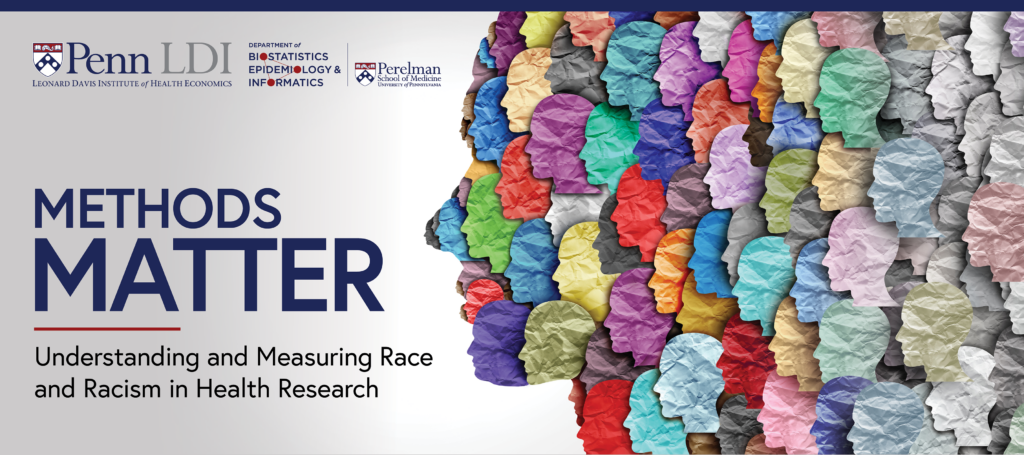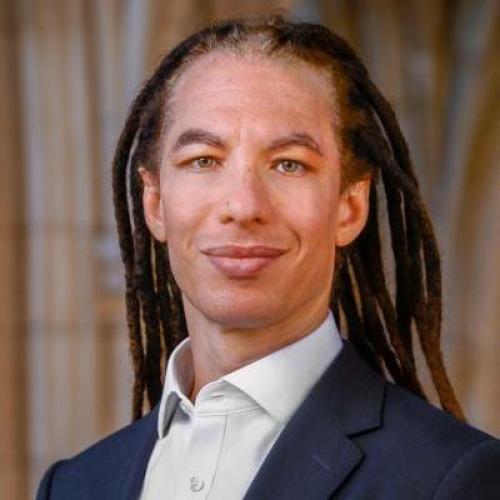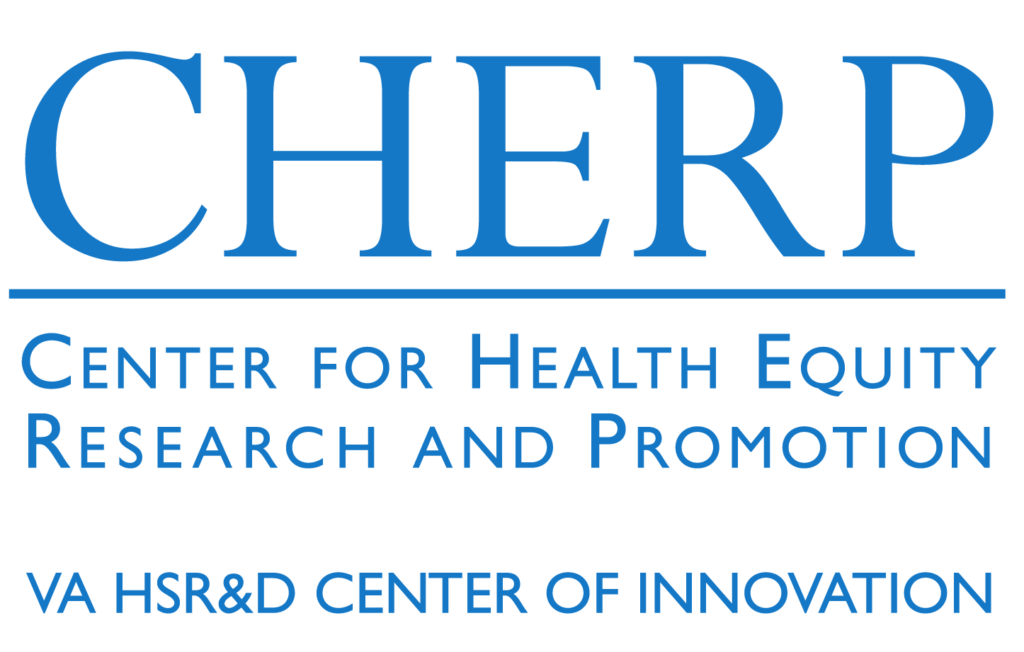Health Equity
Methods Matter: Understanding and Measuring Race and Racism in Health Research
Penn LDI Conference

Research is essential for understanding, quantifying, and eliminating disparities in health outcomes. While racism generates and maintains health inequities, there is less clarity and consensus about how racism can be measured and modeled in research, which holds profound implications for eliminating health disparities and improving population health. Join Penn LDI and the Department of Biostatistics, Epidemiology, and Informatics as we convene national experts across multiple disciplines to critically assess the state of the field with the ultimate goal of moving the science on the links between race, racism, and health forward.
In this one-day conference, we will 1) critically explore the current state of the field regarding known sources of structural and institutional racism and their links to health; 2) explore foundational theories to guide the study of race and racism in health and health care; 3) critically analyze current state-of-the-art research methods to measure, model, and interpret the links between racism and health; and 4) use case studies to apply these theories and methods to real-world scenarios.
Conference Agenda
9:30 a.m.
Breakfast/Registration
10:00 a.m.
Welcome and Opening Remarks
- Courtney Boen, PhD, MPH
Assistant Professor, Sociology, School of Arts and Sciences, University of Pennsylvania - Enrique Schisterman, PhD
Perelman Professor, Biostatistics, Epidemiology and Informatics and Chair, Department of Biostatistics, Epidemiology, and Informatics, University of Pennsylvania - Rachel M. Werner, MD, PhD
Executive Director, Penn LDI; Robert D. Eilers Professor, Health Care Management and Economics, The Wharton School; Professor, Medicine, Perelman School of Medicine, University of Pennsylvania
10:15 a.m.
Matching Theory to Methods
- Tyson Brown, PhD
WLF Associate Professor, Sociology, Duke University - Frank Edwards, PhD
Assistant Professor, School of Criminal Justice, Rutgers University Newark - Margaret Hicken, PhD, MPH
Associate Professor, Survey Research Center, Institute for Social Research, University of Michigan - Ana V. Diez Roux, MD, PhD
Distinguished University Professor of Epidemiology, Director, Urban Health Collective, Drexel University - Moderator: Elaine Hernandez, PhD, MPH
Associate Professor, Sociology, Indiana University Bloomington
11:45 a.m.
Lunch and Networking
12:45 p.m.
Measuring and Interpreting Racism and Racial Disparities
- Aislinn Bohren, PhD
Associate Professor, Economics, School of Arts & Sciences, University of Pennsylvania - Jackie Jahn, PhD, MPH
Assistant Professor, Epidemiology, Dornsife School of Public Health, Drexel University
1:45 p.m.
Break
2:00 p.m.
Challenges of Measuring Structural Racism: A Case Study of Redlining
- Michael Esposito, PhD
Assistant Professor, Sociology, University of Minnesota - Nick Graetz, PhD, MPH
Postdoctoral Research Associate, Department of Sociology, Princeton University
3:00 p.m.
Break
3:15 p.m.
Race in Clinical Prediction
- Amaka Eneanya, MD, MPH
Chief Transformation Officer, Emory Healthcare - Atheendar Venkataramani, MD, PhD
Assistant Professor, Medical Ethics and Health Policy and Director, Opportunity for Health Lab, Perelman School of Medicine, University of Pennsylvania
Conference Sponsors
Conference Speakers

Courtney Boen, PhD, MPH
Courtney Boen is an Assistant Professor and Axilrod Faculty Fellow in the Department of Sociology at the University of Pennsylvania. Dr. Boen is also a Senior Fellow at the Leonard Davis Institute of Health Economics. Her research focuses on the social determinants of population health inequality, with particular attention to the social factors producing racial, immigrant-native, and socioeconomic health inequities across the life span. She holds a Master’s degree in Public Health from Tufts University, and a PhD in Sociology from the University of North Carolina at Chapel Hill.

Aislinn Bohren, PhD
Aislinn Bohren is an Associate Professor of Economics at the University of Pennsylvania. Dr. Bohren’s research examines questions related to social learning, learning under model misspecification, biased beliefs, discrimination, and moral hazard. She holds a PhD in Economics from the University of California San Diego.

Tyson Brown, PhD
Tyson Brown is an Associate Professor of Sociology at Duke University, where he holds the W.L.F. endowed chair and directs the Center on Health & Society. Dr. Brown’s research focuses on the scientific study of racism and its effects on health, with special attention to utilizing interdisciplinary theories and novel methods. He holds a PhD in Sociology from the University of North Carolina, Chapel Hill.

Frank Edwards, PhD
Frank Edwards is an Assistant Professor of Sociology at the Rutgers-Newark School of Criminal Justice. Dr. Edwards is broadly interested in social control, the welfare state, race, and applied statistics. He holds a PhD in Sociology from the University of Washington.

Amaka Eneanya, MD, MPH
Amaka Eneanya is the Chief Transformation Officer at Emory Healthcare in Atlanta, Georgia. Previously, she was the Head of Strategy and Operations, Global Medical Office at Fresenius Medical Care. A nephrologist by training, Dr. Eneanya’s clinical and research efforts have focused on patient-centered care and health equity. She holds a medical degree from Meharry Medical College and a Master’s degree in Public Health from Harvard T.H. Chan School of Public Health.

Michael Esposito, PhD
Michael Esposito is an Assistant Professor of Sociology at the University of Minnesota. Dr. Esposito’s research focuses on understanding the production of racialized disparities in population health through institutions and social systems. He holds a PhD in Sociology from the University of Washington.

Nick Graetz, PhD, MPH
Nick Graetz is a Postdoctoral Research Associate at the Department of Sociology at Princeton University, where he leads a collaboration between Princeton’s Eviction Lab and the U.S. Census Bureau. Dr. Graetz is interested in sociological methods, including Bayesian hierarchical modeling and data visualization, racial segregation and urban life, education, and health policy. He holds a Master’s degree in Public Health from the University of Washington, and a PhD in Demography and Sociology from the University of Pennsylvania.

Elaine Hernandez, PhD, MPH
Elaine Hernandez is an Associate Professor in the Department of Sociology at Indiana University Bloomington. Dr. Hernandez studies the social, structural, and biological processes that create and perpetuate inequities in health demography and health policy. She holds a Master’s degree in Public Health Administration and Policy and a PhD in Sociology from the University of Minnesota.

Margaret Hicken, PhD, MPH
Margaret Hicken is an Associate Professor at the University of Michigan Institute for Social Research, with appointments in the Department of Epidemiology in the School of Public Health and the Department of Internal Medicine at Michigan Medicine. Through her work, she examines how cultural and structural racism maintains racial inequities in population health through biological processes.

Jaquelyn (Jackie) Jahn, PhD, MPH
Jackie Jahn is an Assistant Professor in the Department of Epidemiology and Biostatistics and The Ubuntu Center on Racism, Global Movements, and Population Health Equity at the Dornsife School of Public Health at Drexel University. Dr. Jahn’s research investigates how structural racism shapes maternal and child health and population health equity. She holds a Master’s degree in Public Health and PhD in Population Health Sciences from Harvard T.H. Chan School of Public Health.

Ana V. Diez Roux, MD, PhD, MPH
Ana V. Diez Roux is the Director of the Urban Health Collective and Distinguished University Professor of Epidemiology at the Drexel Dornsife School of Public Health, where she served as Dean for ten years. Dr. Diez Roux is internationally known for her research on the social determinants of population health and the study of how neighborhoods affect health. She holds a medical degree from the University of Buenos Aires, Argentina and a Master’s degree in Public Health and PhD in Health Policy and Management from John Hopkins University.

Enrique Schisterman, PhD
Enrique Schisterman is the chair of the Department of Biostatistics, Epidemiology, and Informatics at the Perelman School of Medicine. Dr. Schisterman is a national leader in reproductive epidemiology, epidemiological methods, statistical methods and study design. He holds a PhD in Epidemiology from the State University of New York at Buffalo.

Atheendar Venkataramani, MD, PhD
Atheendar Venkataramani is an Assistant Professor in the Department of Medical Ethics and Health Policy at the Perelman School of Medicine and a board-certified general internist at the University of Pennsylvania Presbyterian Medical Center. Dr. Venkataramani is also the Director of the Opportunity for Health Lab and a Senior Fellow at the Leonard Davis Institute of Health Economics. His research focuses on the relationship between economic opportunities and health behaviors and outcomes and how social policies can have spillover impacts on health outcomes. He holds a medical degree from Washington University in St. Louis, and a PhD in Health Policy in Economics from Yale University.

Rachel M. Werner, MD, PhD
Rachel M. Werner is the Executive Director of the Leonard Davis Institute of Health Economics. Dr. Werner is Professor of Medicine at the University of Pennsylvania Perelman School of Medicine as well as the Robert D. Eilers Professor of Health Care Management and Economics at the Wharton School and a VA physician at the Philadelphia VA. Dr. Werner has built a foundational research program examining the effects of health care policies on health care delivery, using methods designed to draw causal inference from observational data. She holds a medical degree and PhD in Health Economics from the University of Pennsylvania.
Conference Planning Committee
- Courtney Boen, PhD, MPH
Assistant Professor, Sociology, School of Arts & Sciences - Paula Chatterjee, MD, MPH
Director, Health Equity Research, Penn LDI; Assistant Professor, Medicine, Perelman School of Medicine - Kaday Kamara
Policy Coordinator, Penn LDI - Enrique Schisterman, PhD
Perelman Professor, Biostatistics, Epidemiology and Informatics and Chair, Department of Biostatistics, Epidemiology, and Informatics - Atheendar Venkataramani, MD, PhD
Assistant Professor, Medical Ethics and Health Policy, Perelman School of Medicine - Rachel M. Werner, MD, PhD
Executive Director, Penn LDI; Robert D. Eilers Professor, Health Care Management and Economics, The Wharton School; Professor, Medicine, Perelman School of Medicine







